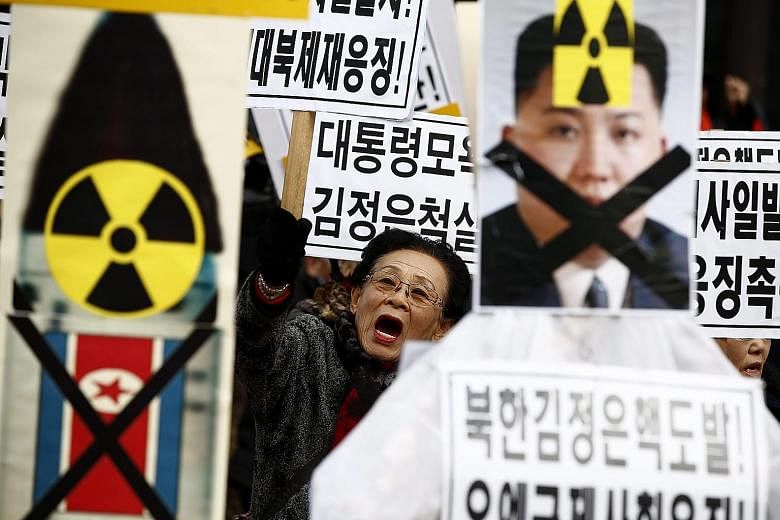SEOUL • In the wake of North Korea's nuclear tests and satellite launches, some conservatives in South Korea are championing a strategy that was once seen as unthinkable: arming their own country with nuclear weapons.
Several members of President Park Geun Hye's party have called for developing a nuclear programme, a view that for now is confined to a small band of conservative politicians and pundits - most notably columnists affiliated with the country's largest conservative newspaper, Chosun Ilbo.
Still, the notion of nuclear sovereignty holds sizeable emotional sway over South Koreans, many of whom have never fully trusted the US commitment to their defence or China's promise to help halt North Korea's nuclear programme.
In a survey by the Asan Institute for Policy Studies in Seoul after the North's third nuclear test in 2013, 66.5 per cent of respondents supported a home-grown nuclear programme. That share has fallen but still hovers between 52.5 per cent and 54 per cent in polls after the North's latest nuclear test on Jan 6.
"If we give up securing our own nuclear deterrent for fear of international opposition and depend unilaterally on the United States, we will become nothing but a chess piece manipulated by big powers," said analyst Cheong Seong Chang at the Sejong Institute, south of Seoul.
"We need to arm with nuclear weapons so as not to become sandwiched between the US and China."
Some advocates of a South Korean nuclear programme acknowledge they want to put pressure on China, as frustration grows with its inability - or unwillingness - to rein in its North Korean ally.
Ms Park has worked on a strategic partnership with China. But when Seoul asked Beijing to boost sanctions on Pyongyang, it was told to restrain itself. China also demanded that South Korea stop negotiating the deployment of an advanced US missile defence system, saying it threatened its security.
After the North's latest nuclear test, Ms Park did not publicly admonish or discourage the hawkish wing of her party, though she did reaffirm South Korea's commitment to nuclear non-proliferation.
South Korean officials and analysts alike have long said the country had too much to lose if it decided to go nuclear. Its export-dependent economy would founder under global sanctions if it left the Nuclear Non-Proliferation Treaty. And it could trigger a regional arms race.
It would be a "profoundly wrong-headed and even tragic" move that would seriously undermine South Korea's alliance with the US and make it less secure, said Mr Jonathan Pollack, a senior fellow at the Centre for East Asia Policy Studies at the Brookings Institution.
The fear of being abandoned by the Americans has deep roots. From an early age, South Koreans are taught that Korea was betrayed by the former Soviet Union and the US after World War II, leading to a divided Korean peninsula.
Mr Cheong said South Korea could build a nuclear weapon within 18 months.
NEW YORK TIMES

